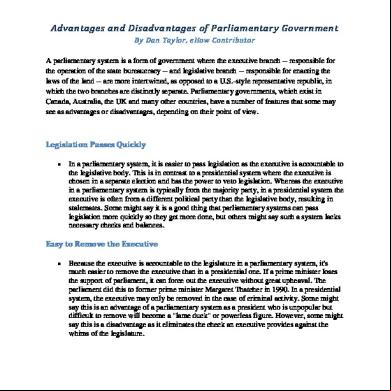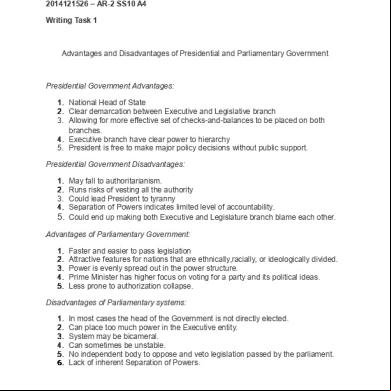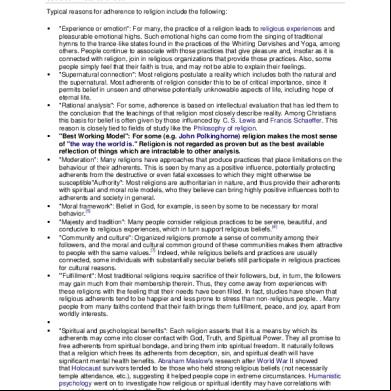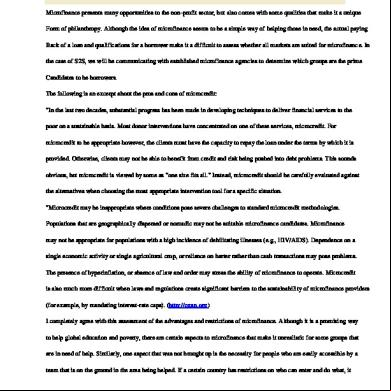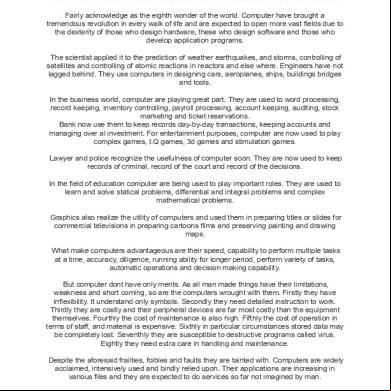Advantages And Disadvantages Of Parliamentary Government w3t4o
This document was ed by and they confirmed that they have the permission to share it. If you are author or own the copyright of this book, please report to us by using this report form. Report 3b7i
Overview 3e4r5l
& View Advantages And Disadvantages Of Parliamentary Government as PDF for free.
More details w3441
- Words: 513
- Pages: 2
Advantages and Disadvantages of Parliamentary Government By Dan Taylor, eHow Contributor A parliamentary system is a form of government where the executive branch -- responsible for the operation of the state bureaucracy -- and legislative branch -- responsible for enacting the laws of the land -- are more intertwined, as opposed to a U.S.-style representative republic, in which the two branches are distinctly separate. Parliamentary governments, which exist in Canada, Australia, the UK and many other countries, have a number of features that some may see as advantages or disadvantages, depending on their point of view.
Legislation es Quickly
In a parliamentary system, it is easier to legislation as the executive is able to the legislative body. This is in contrast to a presidential system where the executive is chosen in a separate election and has the power to veto legislation. Whereas the executive in a parliamentary system is typically from the majority party, in a presidential system the executive is often from a different political party than the legislative body, resulting in stalemates. Some might say it is a good thing that parliamentary systems can legislation more quickly so they get more done, but others might say such a system lacks necessary checks and balances.
Easy to Remove the Executive
Because the executive is able to the legislature in a parliamentary system, it's much easier to remove the executive than in a presidential one. If a prime minister loses the of parliament, it can force out the executive without great upheaval. The parliament did this to former prime minister Margaret Thatcher in 1990. In a presidential system, the executive may only be removed in the case of criminal activity. Some might say this is an advantage of a parliamentary system as a president who is unpopular but difficult to remove will become a "lame duck" or powerless figure. However, some might say this is a disadvantage as it eliminates the check an executive provides against the whims of the legislature.
Minority Rights
Some criticize the parliamentary system for being too democratic, pushing aside the needs of the minority in favor of the majority. Whereas in a presidential system a legislative body is held in check by an executive and a judicial branch of government, in a parliamentary system the legislature is the most influential part of the government. However, some argue that the presidential system is flawed because voters democratically elect both the legislative and executive branches anyway, and thus both can claim a democratic mandate, whereas voters choose a single legislative and executive body in a parliamentary system.
Power Spread Out (Decentralization of Power)
Power is more divided in a parliamentary system, spread out among a number of leaders in parliament, including the prime minister, the majority party leader and the whip, to name a few. A prime minister does not have as much power as a president, and thus political ideas are more important than individual people. In a parliamentary system, a shift in power can take place without an election.
source: http://www.ehow.com/info_8216763_advantages-disadvantages-parliamentary-government.html
Legislation es Quickly
In a parliamentary system, it is easier to legislation as the executive is able to the legislative body. This is in contrast to a presidential system where the executive is chosen in a separate election and has the power to veto legislation. Whereas the executive in a parliamentary system is typically from the majority party, in a presidential system the executive is often from a different political party than the legislative body, resulting in stalemates. Some might say it is a good thing that parliamentary systems can legislation more quickly so they get more done, but others might say such a system lacks necessary checks and balances.
Easy to Remove the Executive
Because the executive is able to the legislature in a parliamentary system, it's much easier to remove the executive than in a presidential one. If a prime minister loses the of parliament, it can force out the executive without great upheaval. The parliament did this to former prime minister Margaret Thatcher in 1990. In a presidential system, the executive may only be removed in the case of criminal activity. Some might say this is an advantage of a parliamentary system as a president who is unpopular but difficult to remove will become a "lame duck" or powerless figure. However, some might say this is a disadvantage as it eliminates the check an executive provides against the whims of the legislature.
Minority Rights
Some criticize the parliamentary system for being too democratic, pushing aside the needs of the minority in favor of the majority. Whereas in a presidential system a legislative body is held in check by an executive and a judicial branch of government, in a parliamentary system the legislature is the most influential part of the government. However, some argue that the presidential system is flawed because voters democratically elect both the legislative and executive branches anyway, and thus both can claim a democratic mandate, whereas voters choose a single legislative and executive body in a parliamentary system.
Power Spread Out (Decentralization of Power)
Power is more divided in a parliamentary system, spread out among a number of leaders in parliament, including the prime minister, the majority party leader and the whip, to name a few. A prime minister does not have as much power as a president, and thus political ideas are more important than individual people. In a parliamentary system, a shift in power can take place without an election.
source: http://www.ehow.com/info_8216763_advantages-disadvantages-parliamentary-government.html
